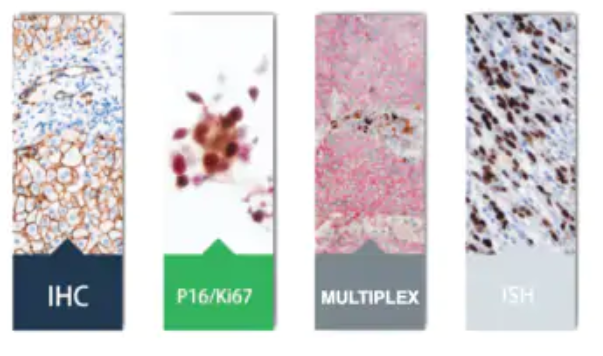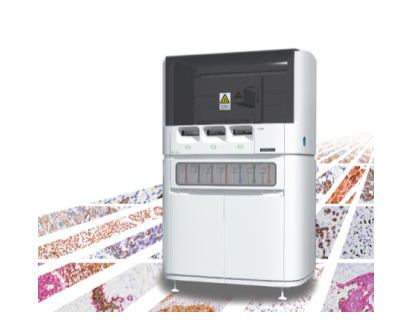Full Automatic Multiplex IHC Stainer: Cutting-Edge Technology Explained

By admin
The advancements in medical diagnostics have drastically reshaped how we address various health conditions, with immunohistochemistry (IHC) playing a pivotal role. The emergence of Full Automatic Multiplex IHC Stainer technology signifies a breakthrough, enhancing accuracy, efficiency, and diagnostic outcomes. This article delves into the intricacies of this innovative technology, emphasizing its importance, specific applications, and revolutionary impact on pathology and research.
Overview of the Full Automatic Multiplex IHC Stainer
What is a Full Automatic Multiplex IHC Stainer?
A Full Automatic Multiplex IHC Stainer is a sophisticated device designed to streamline and automate the immunohistochemistry staining process. This advanced technology allows for the simultaneous detection and visualization of multiple antigen targets on a single tissue slide. By employing automated systems, laboratories can significantly reduce manual intervention, increase throughput, and enhance staining consistency and accuracy.
History and Development of IHC Staining Techniques
The history of IHC staining techniques dates back to the early 20th century when scientists first started to use antibodies to detect specific proteins in tissues. Over the decades, the methods have evolved from basic enzyme-linked immunosorbent assays to complex staining procedures. The development of multiplex staining techniques marked a significant turning point, allowing for the simultaneous observation of multiple antigens. As technology progressed, the transition to full automation in multiplex IHC stainers has further revolutionized the field, reducing human error and improving reproducibility.
Importance and Benefits in Modern Pathology
The Full Automatic Multiplex IHC Stainer has become an indispensable tool in modern pathology. Its ability to accurately and efficiently process multiple samples simultaneously is crucial for high-throughput laboratories. This technology enhances diagnostic precision, enabling pathologists to make more accurate assessments of disease states, particularly in cancer diagnostics. Additionally, it offers significant time savings and operational efficiency, allowing healthcare professionals to focus on more complex diagnostic tasks and improving the overall workflow in pathology labs.
Specific Product: CNT330 Full Automatic Multiplex IHC Stainer
The described system of CNT330 Full Automatic Multiplex IHC Stainer is a full-automatic platform designed for a broad range of medical diagnostic applications, including Immunohistochemistry (IHC), Multiplex IHC, and In Situ Hybridization (ISH). It streamlines the entire process from baking and deparaffinization to antigen retrieval, blocking, detection, and counterstaining, significantly enhancing workflow efficiency. The system boasts an intuitive software interface that facilitates visual monitoring of reagent volumes, running times, and fault messages, ensuring seamless operation. Waste management is optimized with separate containers for non-toxic deparaffinization solution, hazardous (DAB) waste, and non-hazardous waste, contributing to cost savings in waste disposal. Its multifunctionality supports various protocols like IHC, ISH, multiplex IHC (mIHC), and immunocytochemistry (ICC), underscoring its versatility.
Precision temperature control, featuring 30 individual heating units capable of reaching 100°C for antigen retrieval, ensures optimal conditions for each step. Dispense volume can be finely adjusted between 80ul and 120ul for precise staining results, while reagent containers offer capacities of 7ml and 30ml, with a total of 36 spots. A bulk liquid container of 2.5L and waste containers in 2.5L and 18L sizes cater to varying needs. The fluid probe is made of PTFE-coated titanium alloy, ensuring durability and precision during reagent dispensing.
As for the environmental conditions, it must be maintained within an operating temperature range of 5°C to 35°C (41°F to 95°F) to ensure stable performance. Its maximum heating energy output is rated at 1200VA, indicating its capacity to generate sufficient heat for various processes. The dimensions of the equipment are 960mm in length, 720mm in width, and 1608mm in height, making it a substantial piece of machinery that requires adequate space for installation and operation. Additionally, the weight of the equipment is 300 kg, highlighting its sturdy construction and the need for careful handling during transportation and placement.
Applications in Diagnostics and Research
Role in Cancer Diagnostics
In cancer diagnostics, the Full Automatic Multiplex IHC Stainer plays a pivotal role. By enabling the simultaneous detection of multiple tumor markers, this technology allows for a comprehensive analysis of tumor biology. Multi-color immunohistochemistry, in particular, facilitates a more intuitive understanding of the spatial relationships between different antigens, thereby improving the detection rate of tumor microfiltration This contributes to more accurate diagnosis and better-informed therapeutic decisions, ultimately enhancing patient outcomes.
Use in Neuroscience Research
The Full Automatic Multiplex IHC Stainer is also highly valuable in neuroscience research. Neuroscience often requires a detailed examination of neural tissues to understand various brain conditions and diseases. The ability to simultaneously visualize multiple neural markers on a single tissue section can provide deeper insights into neuronal connections, signaling pathways, and pathological changes. This comprehensive staining approach aids researchers in unraveling the complexities of the nervous system and developing potential treatments for neurological disorders.
Other Medical Research Applications
Beyond cancer diagnostics and neuroscience, the Full Automatic Multiplex IHC Stainer finds applications in a wide range of medical research fields. It is instrumental in studying infectious diseases, enabling the identification of pathogens and host responses within tissue samples. Additionally, it supports research into autoimmune disorders by allowing the detailed analysis of immune cell infiltration and activation in affected tissues. By providing high-throughput, precise staining capabilities, this technology underpins a multitude of research endeavors, driving advancements across various medical disciplines.
Celnovte
Celnovte is a leading biotechnology company, known for its development and manufacturing of advanced medical diagnostic tools. With a strong commitment to innovation and excellence, the company drives the creation of cutting-edge solutions to meet the evolving needs of modern medical diagnostics. Their product range includes high-quality immunohistochemistry reagents, primary antibodies, and fully automated staining systems. In addition to the CNT330 Full Automatic Multiplex IHC Stainer, Celnovte also offers the CNT360 Full-Automatic IHC&ISH Stainer and the CNT300 Full Automatic Multiplex IHC Stainer. These carefully designed products aim to improve the accuracy and speed of pathological diagnosis, making them invaluable resources for laboratories and healthcare institutions worldwide.
Essentially, Celnovte has positioned itself as a dependable partner in medical diagnostics, offering a complete suite of products that combine quality, efficiency, and state-of-the-art innovation. Serving both laboratory professionals and medical institutions, Celnovte delivers customized diagnostic solutions that consistently surpass expectations.
In conclusion, the Full Automatic Multiplex IHC Stainer illustrates the dynamic evolution of immunohistochemistry and its profound impact on medical diagnostics and research. By offering unparalleled accuracy, efficiency, and versatility, this technology paves the way for more precise and comprehensive pathological analyses, ultimately advancing healthcare outcomes and scientific understanding.
Future Trends in Immunohistochemistry
Innovations in Multiplexing Capabilities
The landscape of immunohistochemistry is ever-evolving, with significant innovations on the horizon, particularly in multiplexing capabilities. The Full Automatic Multiplex IHC Stainer is at the forefront of these advancements, especially the Full Automatic Multiplex IHC Stainer which Celnovte offers, enabling the simultaneous analysis of multiple biomarkers on a single tissue slide. As technology advances, we can expect even greater sophistication in multiplexing, allowing for the identification of a broader array of antigens.
Integration with Artificial Intelligence
The integration of artificial intelligence (AI) with the Full Automatic Multiplex IHC Stainer holds immense potential for transforming immunohistochemistry. AI can assist in the intricate analysis of complex staining patterns, offering quantitative assessments that surpass human capabilities. By leveraging machine learning algorithms, AI can identify subtle changes in tissue samples that might be overlooked by the human eye. Furthermore, AI-driven data analytics can streamline the diagnostic process, reducing the time required for analysis and increasing the accuracy of results. This symbiotic relationship between AI and advanced staining technology promises to revolutionize medical diagnostics, making it faster, more accurate, and more reliable.
Potential for Personalized Medicine
The advancements brought about by the Full Automatic Multiplex IHC Stainer play a crucial role in the burgeoning field of personalized medicine. By providing a detailed molecular profile of tissue samples, this technology enables the customization of therapeutic strategies to meet the unique needs of individual patients. Personalized medicine relies on precise diagnostic tools to tailor treatments, especially in oncology, where understanding the specific genetic and protein expression profiles of tumors can guide targeted therapies. As the ability to simultaneously detect multiple biomarkers improves, the Full Automatic Multiplex IHC Stainer will be instrumental in developing personalized treatment plans that offer better efficacy and reduced side effects, ultimately improving patient outcomes.
Conclusion: Embracing Advanced Technology for Better Healthcare Outcomes
In conclusion, the Full Automatic Multiplex IHC Stainer exemplifies the radical improvements in immunohistochemistry and their vast implications for medical diagnostics and research. This cutting-edge technology brings together precision, efficiency, and versatility, making it an indispensable tool in modern pathology. As we move forward, innovations in multiplexing capabilities, integration with artificial intelligence, and the potential for personalized medicine will continue to drive the field. If you want to know more about the Full Automatic Multiplex IHC Stainer and specific models, please click on the official website of Celnovte.
RELATED PRODUCTS









